Intellectualization is a defense mechanism that many individuals employ to cope with challenging situations.
In this article, we will delve into the concept of intellectualization, its purpose, potential problems associated with over-reliance on this defense mechanism, and how therapists can effectively guide clients through it. We will also explore a real-life case study to illustrate the impact of the defense mechanism of intellectualization on emotional expression.
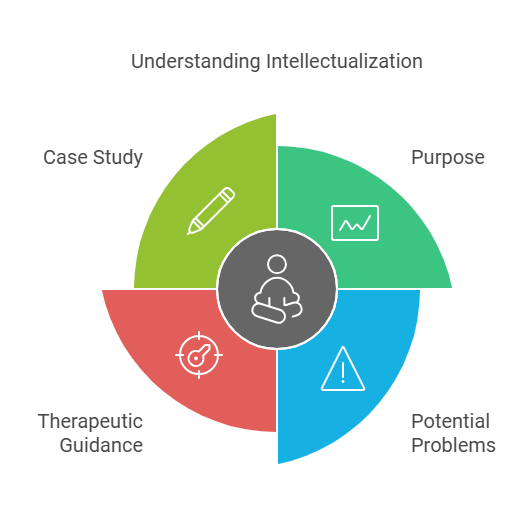
Intellectualization: Case Study
Do you notice something out of ordinary here?
Isn’t this reaction unexpected?
Wouldn’t you expect some element of shock or sadness instead of the patient’s apparent poker face expression to the news of his cancer?
Is it possible that the patient is using ‘thinking to avoid feeling? ‘
In psychology, this behaviour pattern is referred to as intellectualization.
What is the defense mechanism of intellectualization?
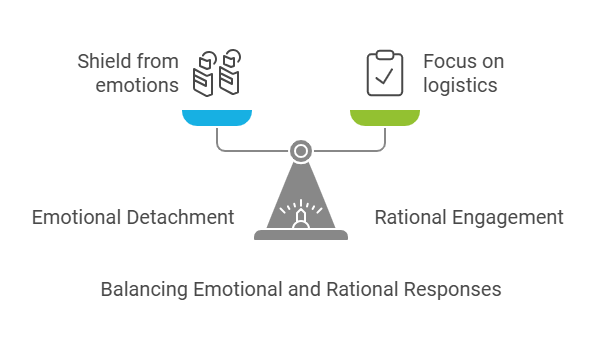
Intellectualization, as per Freudian psychology, involves immersing oneself deeply in the rational aspects of a situation while consciously disregarding the emotional dimension.
It acts as a shield against overwhelming emotions, allowing individuals to analyze distressing events with a clinical detachment.
Another example would be that of a college going student who loses her father but is extensively involved in the funerary procedures without shedding a drop of tear.
Instead of being shattered by imagining a life without her Daddy, the 17 year-old worries about getting the right venue for her father’s post-funeral gathering.
How Defense mechanism of intellectualization helps?
The conscious analysis of a devastating event helps people to emotionally distance themselves from the anxiety-provoking stimuli.
Coming back to the above story, notice the words being used by the patient… Survival rates, Chemotherapy, Side effects, Expenditure, Insurance.
These individuals deliberately select such intricate words as a strategic choice. The complexity in language serves to advance their objective of adopting a detached and clinical demeanor, effectively mitigating the accumulating stress they might be experiencing.
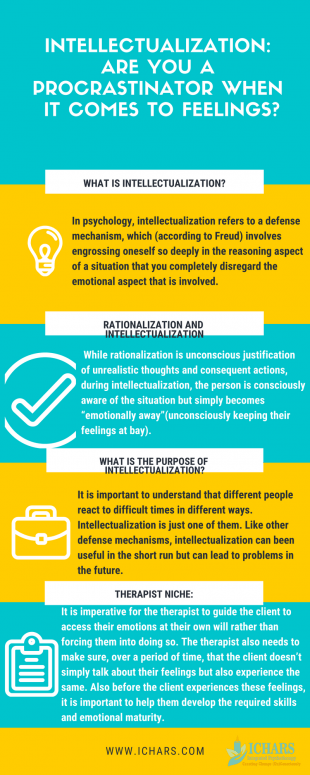
Rationalization & Intellectualization
People at times incorrectly use the words rationalization and intellectualization interchangeably.
Rationalization is unconscious justification of unrealistic thoughts and consequent actions.
While during intellectualization, the person is consciously aware of the situation but simply become “emotionally away”, unconsciously keeping their feelings at bay.
They neither live in denial nor do they try and justify that whatever has happened to them makes sense at some level.
It’s like cutting a piece of cake and saving it separately. At most times the person is not even aware of this chunk lying in the fridge as he / she is focused on the distribution of the rest.
It is however important for one to eat his/her cake in time or else it might rot.
In other words, it is imperative to deal with the suppressed emotions before they can become too dangerous, interfere with our well-being and cause a breakdown.
What is the purpose of Intellectualization as a defense mechanism?
Remember, emotions can be disruptive. Intellectualization basically buys us some time before we decide to face the music!
It is possible to assume that this is done so as to eliminate our frightening thoughts or reduce their intensity instead of letting the sense of helplessness or hopelessness creep in following the diagnosis of a fatal disease or death of a loved one or any similar negative circumstance that life throws at us unexpectedly.
It is important for us to understand that different people react to difficult times in different ways. Intellectualization is just one of them. Like other defense mechanisms, intellectualization can been useful in the short run but can lead to problems in the future.
Therapist Niche: Working with Defense Mechanism of Intellectualization
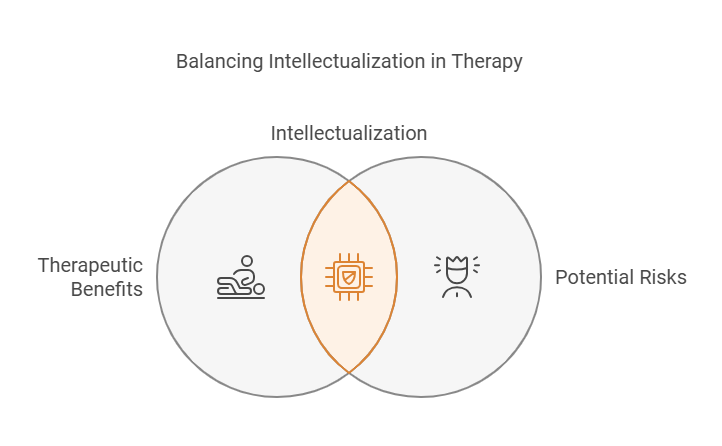
At first glance it may seem appropriate to allow the client and to some extent even help the client intellectualize an intensely negative experience, specially the one’s that the client may not have the skills or the emotional maturity to deal with.
But it is important to remember that intellectualization could lead to breakdowns including psychosomatic health issues in the long run.
Potential Problem to consider
- In the light of these long run negative consequences, it may also seem appropriate to make the client experience and deal with these negative emotion that they’re desperately trying to avoid. But a closer look and experience says that such confrontational tactics at least in the initial phase of therapy has a huge potential to complicate the therapist-client relationship.
- Confrontation without proper “bounce-back” mechanisms in place may lead to the client actually losing trust in their therapist. They may also conclude that such confrontation is indicative of the fact that their therapist doesn’t get them or see things as they see.
- The worst case scenario may not just be that the client will quit therapy without any significant results but that as a result of this confrontation they might not want to go to another therapist as well.
Way forward
It is thus imperative for the therapist to guide the client to access their emotions at their own will rather than forcing them into doing so.
The therapist also needs to make sure, though over a period of time, that the client doesn’t simply talk about their feelings but also experience the same.
Before the client experiences these feelings, it is important to help them develop the required skills and emotional maturity.
How therapists can help clients move past the defense mechanism of intellectualization?
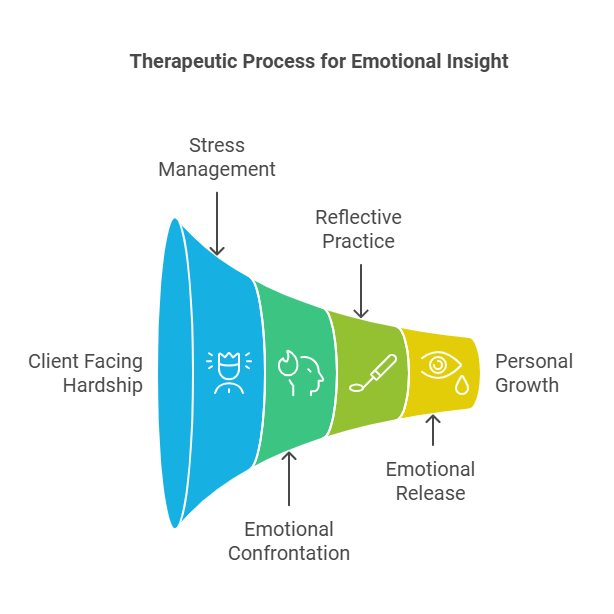
The mental health professional plays a crucial role in guiding clients through the process of relaxation and coping when faced with hardships.
By imparting essential tools for managing stress, clients naturally position themselves to confront and navigate anxious emotions that may arise during therapeutic confrontations.
In these instances, employing confrontation can lead to more favorable outcomes, given the client’s enhanced ability to cope with and process associated emotional challenges.
An alternative approach involves utilizing free association, with techniques such as corrective therapy and SVIT™ recommended for this purpose. By guiding clients to uncover cognitive blockages they may struggle to explain immediately, therapists create an avenue for deeper exploration and understanding.
To further facilitate this process, clients engage in reflective practices, acknowledging genuine feelings and impulses in response to traumatic events. The therapist assists in coaching relaxation techniques and coping skills, drawing from methods in Hypnosis and Neuro-Linguistic Programming (NLP).
Another effective strategy is encouraging clients to document their experiences in detail through writing. Unlike verbal expression, writing demands more time and engagement, allowing clients to delve into the emotional nuances associated with their experiences.
Once clients connect with these emotions and gain experiential insight, therapists can employ various techniques, such as hypnodrama, circle therapy, submodalities, and inner child therapy, to guide clients in releasing these emotions.
Utilizing tools like SOFT SEA and future pacing, therapists assist clients in identifying and developing the necessary skills to progress in life.
Conclusion:
Understanding intellectualization as a defense mechanism is essential for both individuals and therapists. While it serves a purpose in managing distress, overreliance can lead to complications. Therapists, through a strategic and empathetic approach, can assist clients in navigating through intellectualization, fostering emotional acknowledgment and growth.
If you would like to develop skills to help your clients move beyond intellectualization and other defense mechanisms, so that they can accept, acknowledge & resolve their problems do join us for our comprehensive course on Cognitive Hypnotic Psychotherapy™.
It is a unique course that seamlessly integrates different apporaches to psychotherapy (cognitive, behavioural, psycho-dynamic and humanistic) with techniques from of Clinical Hypnosis, NLP, Mindfulness and Metaphors. The Program can literally help you take your therapeutic skills to the next level.

